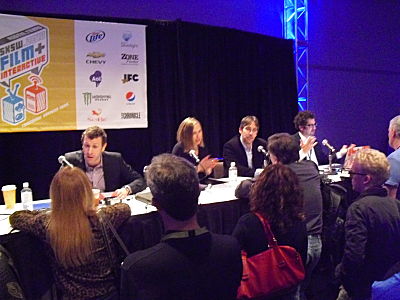If rule number one for content creators is to make amazing content, then rule number two is don’t get sued! Josh Sussman, counsel for CollegeHumor, Koethi Zan, counsel for MTV and Luke Paglia, counsel for American-Eagle marketing all spoke about legal issues the content creators need to understand.
The panelists were quick to point out that this was not an advice session and that a little bit of law knowledge is a dangerous thing! They spent their time discussing aspects of the law, how it effects their clients and possible pitfalls for content creators. Their first recommendation was to find your own counsel!! There are lawyers who do pro-bono work and there is a great website to find those lawyers.
While that may be the best “advice” of the panel, they did discuss Fair Use and Copyright law. Fair Use is a difficult beast to corral. If you don’t know the Fair Use doctrine, this will help! There are questions a content creator can ask to determine if they are within the parameters of Fair Use: How much of the original are you copying? Are you supplanting the market? Is the use transformative?
However, the Fair Use doctrine is incredibly vague. The quote that was thrown out by the panel was that “Fair Use is nothing but the right to hire an attorney!” When Fair Use cases go to litigation, the court rulings are always different and it is all based on individual interpretations of the law. One of the panelists said that the only way one would know if they interpreted the law correctly, is if they actually go to court AND win.
Besides the great discussion about the Fair Use doctrine, the panelists discussed using release forms. Their biggest point was that a producer should never lie to make someone sign a release form. Lying creates a claim of fraudulent inducement. Nine times out of 10, a producer does not need to lie to get people on television. People want to be on television! They also stressed to not be shy about asking for a release. A release can potentially save a ton of money, headaches and stress further into the process.
Overall, I thought this panel was fantastic. As a content creator, I learned much more about the law and about the vagueness of the law. I also learned too much about Jersey Shore. Trust me, you don’t even want to know!




Permalink
I think this post was great. One thing I believe content creators should focus on is to provide the consumer with accurate and original information. If you surf the Web you will find that many Web sites contain similar information. To use someone else’s work or attempt to attribute someone else’s work without citing your sources is a major issue that has come to light over the last few years. With the expansion of blogs and the internet people have begun to put newsworthy information on their sites, in many cases failing to say where they got their information from.
Another thing to consider when talking about copyright and things you should and should not do on the internet is attributing sponsorship within your blog or Web site if your Web site receives any type of monetary consideration. Failing to provide sponsorship can result in consumer decisions to be swayed without just cause.
Permalink
I think it is very important for content creators to be aware of the legal aspects about copying content information. I do not know very much about copyright laws but I think it would be a good thing to learn about. It can be hard to give credit to all the information you use but it is worth it to avoid being sued.
I was not aware that there were lawyers who would do pro-bono work with Fair use and Copyright law. It seems like it can be pretty easy to be sued for almost anything these days. It is good to know that there are lawyers out there to help you prevent that.
Permalink
This seems like it would have been a helpful panel. I like CollegeHumor and I would have been interested to hear what Josh Sussman had to say. I did not know there were websites that could help people find pro-bono lawyers.
As far as the Fair Use doctrine is concerned, I like that the panelists advised content creators to get a lawyer no matter what. I am in a mass communications law class right now and we just studied the Fair Use doctrine. It really does seem like something that could be easily manipulated by different lawyers and judges, so it is good advice to have a lawyer available if you want to publish new content.
Permalink
As journalism becomes more interactive and wide reaching, people may tend to forget that content posted online still needs to be factual and not libeled. The fair use doctrine is an important part of journalism that needs to be understood by any who is submitting information for the benefit of others. Without previous knowledge of court cases involving the doctrine and their rulings, it is very easy for a journalist to slip.
Permalink
In these days when people can sue for almost anything, protecting your self and your content is the key to being successfull. not only do I think that release forms cure the, but they are to be used for even the smallest and most trivial endeavor, just in case some time down the road someone decides to try to make some easy money ripping you off.